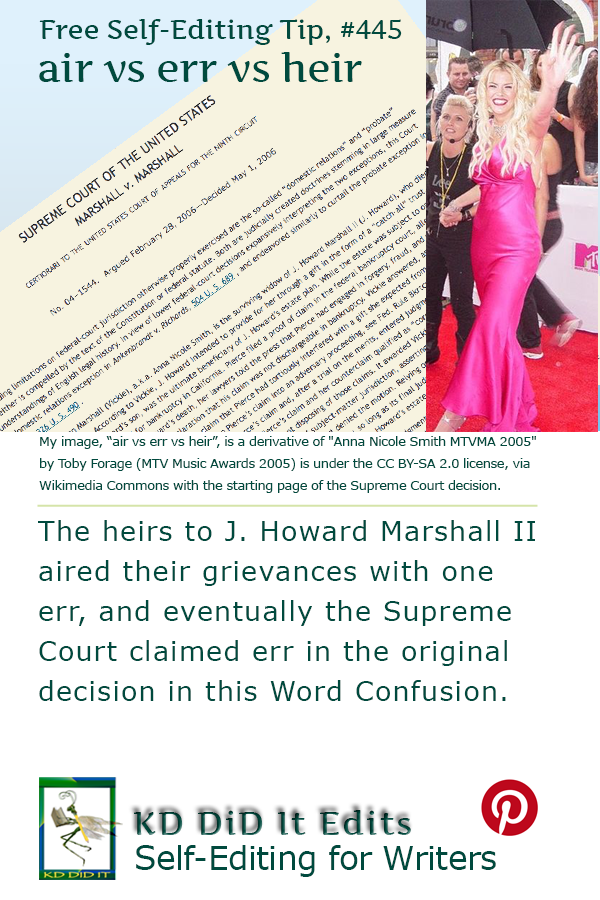It’s hard to believe that anyone could confuse air with heir, but I guess I shouldn’t be surprised by what software manages to ignore. ’Cause I just can’t buy that an author could actually mix this one up, ahem.
I’ve added err to this post (effective 8 November 2016), primarily because it is an heterograph along with air and heir . . . and I’ve learned to expect confusions of all sorts. Of course, I’ll be adding a post for “E’er vs Ere vs Err” and you may want to check out “‘Em, ‘Er, ‘Im . . .“.
Word Confusions . . .
. . . started as my way of dealing with a professional frustration with properly spelled words that were out of context in manuscripts I was editing as well as books I was reviewing. It evolved into a sharing of information with y’all. I’m hoping you’ll share with us words that have been a bête noire for you from either end.
If you found this post on “Air vs Err vs Heir” interesting, consider subscribing to KD Did It, if you’d like to track this post for future updates.
| Air | Err | Heir |
|---|---|---|
 — |
 — |
 — |
| Part of Grammar: | ||
| Adjective 1; Adverb 4; Noun 1, 2, 3 Verb 1, intransitive & transitive |
Verb, intransitive | Noun; Verb, transitive
FEMININE for the noun: heiress Plural for the noun: heirs, heiresses |
| Plural for noun: airs Gerund: airing Third person present verb: airs |
Third person present verb: errs Past tense or past participle: erred Present participle: erring |
Third person present verb: heirs Past tense or past participle: heired Present participle: heiring |
| Adjective: Operating by means of air pressure or by acting upon air 1 Of or relating to aircraft or to aviation Taking place in the air
Adverb:
Noun:
[air of] An impression of a quality or manner given by someone or something 2
[Music] A tune or short melodious composition, typically a song 3 Verb, intransitive: To be broadcast or televised Verb, transitive:
Expose a room to the open air in order to ventilate it
|
[Formal] Be mistaken or incorrect
To stray from the right course or accepted standards
To act with bias, especially favorable bias To go astray in thought, morals, or belief [Archaic] To deviate from the true course, aim, or purpose |
Noun: Person legally entitled to the property or rank of another on that person’s death
Verb, transitive:
|
| Examples: | ||
| Adjective: That air drill sure makes it easier. We’ll need an air pump to blow up that big ol’ mattress. Boeing rules the air industry. World War I was the first air war. Noun: The doctor told me to get some fresh air. He celebrated by tossing his hat high in the air. Air travel gets you there faster. Radio stations have successfully sold products over the air. She answered with a faint air of boredom. He began to put on airs and think he could boss us around. She sang a little air from the 1920s. Verb, intransitive: The programs were aired on India’s state TV network. Verb, transitive: The window sashes were lifted regularly to air the room. |
The judge had erred in ruling that the evidence was inadmissible.
The erring brother who had wrecked his life was back. I had erred in asking Emma to be my wife. Both 2016 presidential candidates have erred in their moral choices. “To err is human, to forgive divine” (Pope). |
Noun Tom was his eldest son and heir. She aspired to marry the heir to the throne. They saw themselves as the true heirs of the Enlightenment. Verb, transitive: “One only daughter heired the royal state” (Dryden, 432). |
| Derivatives: | ||
| Adjective: airing, airless, airlike, airy, unaired, well-aired Noun: airing, airlessness, airs |
Adjective: errable, errant, erring Noun: errability, errancy, errata, erratum, erring, erroneous, error |
Adjective: heirless Noun: heir-at-law, heirdom, heirloom, heirship |
| History of the Word: | ||
|
Middle English in the sense of wander, go astray is from the Old French errer, from the Latin errare meaning to stray. | Middle English via the Old French from the Latin heres. |
C’mon, get it out of your system, bitch, whine, moan . . . which words are your pet peeves? Also, please note that I try to be as accurate as I can, but mistakes happen or I miss something. Email me if you find errors, so I can fix them . . . and we’ll all benefit!
Satisfy your curiosity about other Word Confusions on its homepage or more generally explore the index of self-editing posts. You may also want to explore Book Layout & Formatting Ideas, Formatting Tips, Grammar Explanations, Linguistics, Publishing Tips, the Properly Punctuated, Writing Ideas and Resources, and Working Your Website.
Resources for Air vs Err vs Heir
Some of these links may be affiliate links, and I will earn a small percentage, if you should buy it. It does not affect the price you pay.
Apple Dictionary.com
Dryden, John. The Works of John Dryden. Project Gutenberg, 2021. <https://www.gutenberg.org/files/64337/64337-h/64337-h.htm>; 2022, <https://amzn.to/3VIBLYc>. Both are eBooks. vol 14, book 7.
Pope, Alexander. “An Essay on Criticism.” 2012. EBook. Originally published 1711. <https://amzn.to/3CSaYjF>.
Virgil. John Dryden (trans.) The Æneid. Open Road Media, 2020. EBook. Originally published 19 BC. <https://amzn.to/3yWDSOp>.
WordReference.com: air
Pinterest Photo Credits:
Anna Nicole Smith MTVMA 2005 by Toby Forage (MTV Music Awards 2005) is under the CC BY-SA 2.0 license, via Wikimedia Commons with the starting page of the Supreme Court decision.
Revised as of 2 Apr 2024
By: Kathy Davie

